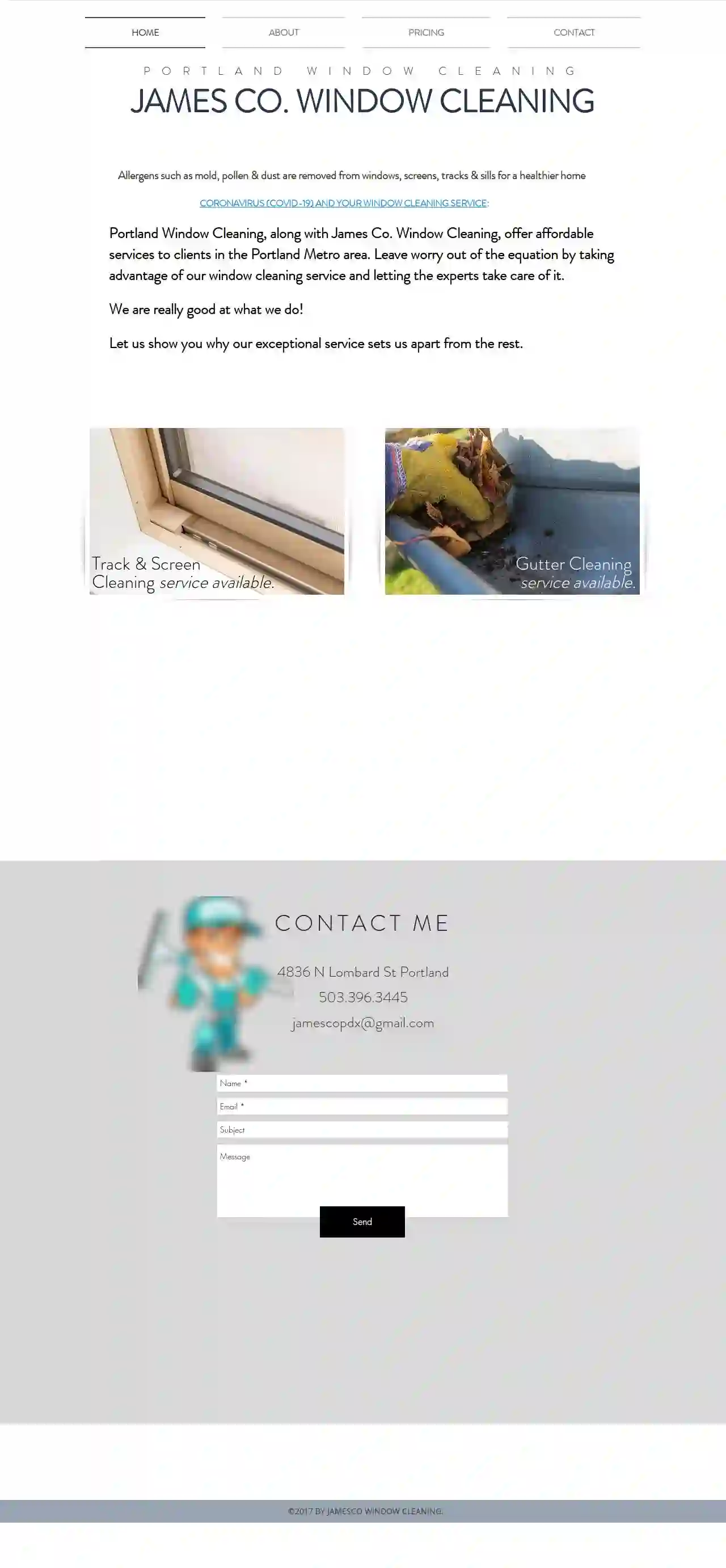Window Cleaning Arundel
Find top Professional Window Cleaning in Arundel
Receive multiple Professional Window Cleaning quotes for your project today! Compare profiles, reviews, accreditations, portfolio, etc... and choose the best deal.

Total Window Cleaning Inc.
4.852 reviews3619 SE 11th Street, Gresham, 97080, USTotal Window Cleaning is a family owned and operated window cleaning service provider that was established in 1996. I built this business 1 customer at a time. I worked by myself for the first few years, until I outgrew myself with long term customers. I had to hire someone to work side by side with me. I went through a few people until I found Sheldon and he stayed with me for 6 years. After that I found Zack and he’s been with me now for 10 years. In 2021 I found Cyrus and he’s being trained to be my lead technician. Jump forward to me meeting my wonderful wife Sunshine. Sunshine worked with me in the field for her first year. That gave her great insight on how the actual work is done. Since then Sunshine has been working in the office doing all the scheduling and all other office work.Our services have expanded from window cleaning and gutter cleaning to all exterior cleaning. We now offer window cleaning, gutter cleaning, solar panel cleaning, roof cleaning, house washing and pressure washing.
- Services
- Why Us?
- Our Team
- Gallery
Get Quote
Dave's Exterior Cleaning | Gutter Cleaning
531 reviewsPortland, USDave's Exterior Cleaning is a veteran-owned and operated business serving Portland, OR and surrounding areas. We specialize in providing top-notch gutter cleaning services, along with roof cleaning, window cleaning, pressure washing, and more. Our team of skilled professionals is dedicated to delivering exceptional customer service and unmatched workmanship. We understand the importance of maintaining your property's exterior and strive to enhance both its functionality and appearance. We offer a 5-year roof cleaning warranty, a 2-year house washing warranty, and a 2-week gutter cleaning warranty. We are committed to using eco-friendly solutions and ensuring your satisfaction.
- Services
- Why Us?
- Accreditations
- Our Team
- Testimonials
- Gallery
Get Quote
Clear Summit Window and Exterior Cleaning
58 reviewsPortland, USWe are your choice for MAINTENANCE cleaning. You work hard, let us work hard for you and take care of your home. We truly believe if we take care of our customers, they will take care of us! Give us a call, we would love to chat! About Find out about our company,mission, our methods, and the results of our hard work.
- Services
- Why Us?
- Our Team
- Testimonials
- Gallery
Get Quote
James Co. Window Cleaning
4.9173 reviews4836 N Lombard St, Portland, USPortland Window Cleaning, along with James Co. Window Cleaning, offer affordable services to clients in the Portland Metro area. Leave worry out of the equation by taking advantage of our window cleaning service and letting the experts take care of it. We are really good at what we do! Let us show you why our exceptional service sets us apart from the rest.
- Services
- Why Us?
- Gallery
Get Quote
USA Gutter, Window, & Roof Cleaning
4.757 reviewsUSWelcome to USA Gutter Roof and Window Cleaning, Portland’s first choice when searching for outdoor maintenance for their roof, gutters and windows. We are a fully licensed, bonded and insured outdoor maintenance business servicing the entire Portland, OR and surrounding areas. With free, no obligation same day quotes, our clients can rest assured they have come to the right place when looking for the best outdoor maintenance program in the region that guarantees 100% satisfaction.Professional Roof & Gutter Cleaning ServicesWe offer our clients and potential clients a variety of services designed to enhance the outdoor appearance of your home as well as increase the life of your windows, gutters and most importantly, your roof.You can rely on our team of professional technicians to provide a superior service, performed with state-of-the-art training, equipment and cleaning chemicals that are both safe and non intrusive to your home or the environment.
- Services
- Why Us?
- Gallery
Get Quote
AA Window & Gutter Cleaning
4.9417 reviews11020 120th Ave NE, Kirkland, 98033, USAA Window & Gutter Cleaning is a family-owned and operated business serving the greater Seattle and Portland metro areas since 1985. We specialize in providing 5-star services for all your exterior cleaning needs, including roof, window, gutter, skylight, and solar panel cleaning. We are committed to safety, quality, and service, guaranteeing our work and offering random safety and quality checks. Our technicians are trained in the latest safety procedures and hold pesticide applicator licenses. We strive to build lasting relationships with our clients by providing exceptional service and personalized attention.
- Services
- Why Us?
- Accreditations
- Our Team
- Testimonials
- Gallery
Get Quote
Crestview Window Cleaning
4.9250 reviewsPortland, USCrestview Window Cleaning is a professional window cleaning service based in Portland, Oregon. We offer a range of services including residential window cleaning, home exterior cleaning, fence cleaning, hardscape cleaning, concrete cleaning, roof cleaning, gutter cleaning, and Christmas lights installation. Our team is dedicated to providing exceptional service and ensuring customer satisfaction.
- Services
- Why Us?
- Gallery
Get Quote
True Clean Window Cleaning
5348 reviews11825 SW Greenburg Rd, Suite 104, Tigard, 97223, USTrue Clean Window Cleaning is Portland's #1 Rated Window Cleaning company, providing professional window and gutter cleaning services to residential and commercial clients. With a team of local experts, we offer a wide range of high-quality services to ensure your home or business's exterior is clean and looking its best. From residential window cleaning to commercial window cleaning, gutter cleaning, and more, we've got you covered. Contact us today to schedule your next service and experience the True Clean difference.
- Services
- Why Us?
- Our Team
- Testimonials
- Gallery
Get Quote
Insight Window Washing
5104 reviews7860 SW 66th Ave, Portland, USInsight Window Washing is a Portland, Oregon based company that utilizes chemical and mineral free water filtered by our cutting edge reverse osmosis filters and state of the art equipment to provide you with the highest quality window washing service at a fraction of the cost. At Insight Window Washing, we don’t just “clean” your windows. We use an brand new process that removes bug residue, tree sap, and even paint. Our team will also take the time to detail your windows – leaving them looking virtually brand new! Do your windows seem dirty almost immediately after you’ve had them cleaned? That’s because chemical cleaners leave a layer of residue that acts as a sticking agent for dust, debris, and bugs. Chemical cleaners can also damage your windows over time, and the residual water used to wash can damage your plants. Because our “Pure Water” cleaning system is entirely chemical free – it’s extremely eco-friendly. This filtered “Pure Water” combined with an extendable brush designed especially for window washing allows us to clean most homes and commercial buildings safely from the ground. Insight Window Washing is the only company in the area utilizing a cutting-edge, industrial grade “Reverse Osmosis” filtration system to create the “Pure Water” we use to clean your windows. Our system provides a better wash and keeps your windows clean twice as long as chemicals!
- Services
- Why Us?
- Our Team
- Gallery
Get Quote
United Window Cleaning, LLC | Windows, Gutters & More | McMinnville, OR
522 reviews1970 NW 21st St, McMinnville, 97128, USAt United Window Cleaning, LLC, we believe that a clean window is the gateway to a brighter and healthier home or office. That's why we strive to provide the best window cleaning services to our customers. Our team of highly trained professionals are equipped with the latest tools and techniques to deliver top-notch window cleaning services. We are committed to providing you with a hassle-free experience. We offer a wide range of window cleaning services, including residential and commercial window cleaning, gutter cleaning, solar panel cleaning, pressure washing, and more. Let us help you keep your windows sparkling clean!
- Services
- Why Us?
- Gallery
Get Quote
Over 60,241+ Cleaning Services registered
Our cleaning pros operate in Arundel & surrounding areas!
CleaningMatch has curated and vetted the Best Janitorial Businesses in and around Arundel. Find a reliable pro today.
Frequently Asked Questions About Window Cleaning
- Ask Directly: When requesting quotes or contacting the company, ask directly if they have liability insurance and workers' compensation insurance.
- Check Their Website: Many reputable window cleaning companies will prominently display their insurance information on their website.
- Request Proof of Insurance: Don't hesitate to request a copy of their insurance certificate for verification. This document outlines their coverage and policy details.
- Online Reviews: Check online reviews and ratings on platforms like Google, Yelp, and Trustpilot to get an idea of customer satisfaction and service quality.
- Experience: Look for companies with a proven track record and experience in the industry. Experience often translates to better techniques and results.
- Licensing and Insurance: Ensure the company is properly licensed and insured. This protects you from liability in case of accidents or damage.
- Quotes and Pricing: Get quotes from multiple companies to compare pricing. Ensure the quotes are detailed and transparent, outlining all services and costs.
- Professionalism: Choose a company that is responsive to inquiries, provides clear communication, and demonstrates professionalism in their interactions.
- Regular Cleaning: Cleaning windows more frequently helps prevent dirt and grime from building up and becoming harder to remove.
- Window Treatments: Using blinds or curtains can help reduce direct sunlight exposure, which can fade furniture and attract dust to windows.
- Landscaping: Trim trees and shrubs near windows to minimize pollen, sap, and bird droppings from accumulating on the glass.
- Air Filtration: Using air filters in your home or business can help reduce airborne dust and pollutants that can settle on windows.
- Protective Coatings: Some professional window cleaners offer protective coatings that can help repel water and dirt, keeping windows cleaner for longer.
How can I tell if a window cleaning company is insured?
A reputable and responsible window cleaning company will be transparent about their insurance coverage, providing peace of mind for their clients.
How do I find a reputable window cleaning service?
Platforms like CleaningMatch can help you find and compare reputable window cleaning services in your area.
How can I prevent my windows from getting dirty so quickly?
By taking these preventive measures, you can prolong the time between window cleanings and keep your windows looking their best.
What is the difference between traditional window cleaning and a water-fed pole system?
Traditional window cleaning involves using squeegees, buckets, and cleaning solutions. This method is effective for reaching lower windows and provides a hands-on approach to cleaning.
Water-fed pole systems use purified water and a telescopic pole with a brush head to clean windows from the ground. This method is ideal for reaching high windows, eliminating the need for ladders. Purified water dries without leaving streaks or spots, providing a spotless finish.
The choice between the two methods depends on the height and accessibility of your windows, as well as your personal preference.
How can I tell if a window cleaning company is insured?
- Ask Directly: When requesting quotes or contacting the company, ask directly if they have liability insurance and workers' compensation insurance.
- Check Their Website: Many reputable window cleaning companies will prominently display their insurance information on their website.
- Request Proof of Insurance: Don't hesitate to request a copy of their insurance certificate for verification. This document outlines their coverage and policy details.
A reputable and responsible window cleaning company will be transparent about their insurance coverage, providing peace of mind for their clients.
How do I find a reputable window cleaning service?
- Online Reviews: Check online reviews and ratings on platforms like Google, Yelp, and Trustpilot to get an idea of customer satisfaction and service quality.
- Experience: Look for companies with a proven track record and experience in the industry. Experience often translates to better techniques and results.
- Licensing and Insurance: Ensure the company is properly licensed and insured. This protects you from liability in case of accidents or damage.
- Quotes and Pricing: Get quotes from multiple companies to compare pricing. Ensure the quotes are detailed and transparent, outlining all services and costs.
- Professionalism: Choose a company that is responsive to inquiries, provides clear communication, and demonstrates professionalism in their interactions.
Platforms like CleaningMatch can help you find and compare reputable window cleaning services in your area.
How can I prevent my windows from getting dirty so quickly?
- Regular Cleaning: Cleaning windows more frequently helps prevent dirt and grime from building up and becoming harder to remove.
- Window Treatments: Using blinds or curtains can help reduce direct sunlight exposure, which can fade furniture and attract dust to windows.
- Landscaping: Trim trees and shrubs near windows to minimize pollen, sap, and bird droppings from accumulating on the glass.
- Air Filtration: Using air filters in your home or business can help reduce airborne dust and pollutants that can settle on windows.
- Protective Coatings: Some professional window cleaners offer protective coatings that can help repel water and dirt, keeping windows cleaner for longer.
By taking these preventive measures, you can prolong the time between window cleanings and keep your windows looking their best.
What is the difference between traditional window cleaning and a water-fed pole system?
Traditional window cleaning involves using squeegees, buckets, and cleaning solutions. This method is effective for reaching lower windows and provides a hands-on approach to cleaning.
Water-fed pole systems use purified water and a telescopic pole with a brush head to clean windows from the ground. This method is ideal for reaching high windows, eliminating the need for ladders. Purified water dries without leaving streaks or spots, providing a spotless finish.
The choice between the two methods depends on the height and accessibility of your windows, as well as your personal preference.